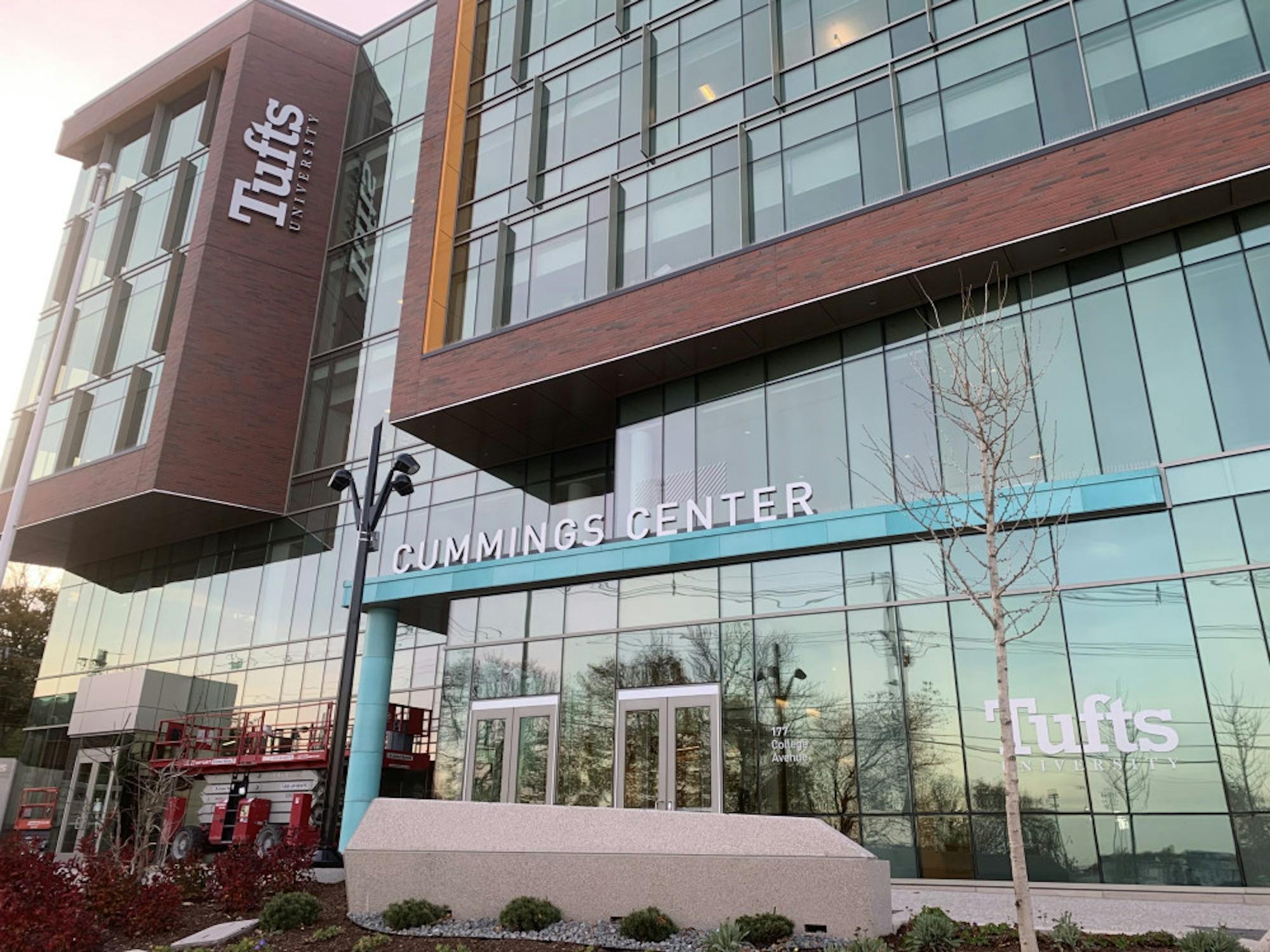Faculty from the Departments of Economics and Computer Science this month are moving into the university’s newest academic facility at the intersection of Boston and College Avenues. Construction of the $90 million building is set to wrap up in the coming weeks after weathering anon-site worker injury and apandemic-induced delay since crews first broke ground more than two years ago.
Named for Medford native Bill Cummings (LA’58) and his wife Joyce, the 148,000-square-foot building is the latest in a series of university investments in infrastructure supportive of multidisciplinary learning. The six-story building will house economics, computer science and mathematics, as well as two programs in The Fletcher School and multiple studios focused on research and entrepreneurship. In addition to classrooms and office space for faculty, the facility features collaborative spaces for student study.
The building will also house a cafe, which will not be operated by Tufts Dining nor accept JumboCash, Director of Dining and Business Services Patti Klos said in an email. Jason McClellan, senior director of auxiliary services, said the university is negotiating with a cafe provider, and that the cafe will not be operational as faculty move in this month.
The building’s unveiling marks the culmination of more than six years of planning and construction. Initial plans called for an above-ground footbridge across Boston Avenue, but the design was scrapped once the Massachusetts Bay Transportation Authority changed its plans for the extension of the Green Line, citing cost overruns. The new Medford/Tufts station of the Green Line is set to open adjacent to the Cummings Center inMay of next year.
The building is funded largely by a multimillion-dollar donation from the Cummings Foundation, which donates regularly to nonprofits in New England. The foundation is led by Bill Cummings, a real estate mogul who is also the namesake of the university’s school of veterinary medicine in Grafton. A spokesperson for the university was unable to disclose the size of the donation, citing concerns over confidentiality.
The economics department and the majority of the computer science department will move in this month, while the remainder will join them in January along with the entirety of the math department, Director of Strategic Capital Programs Ruth Bennett said in a statement. The university crafted the schedule for move-in after consulting with faculty and department chairs, who were mostly able to choose when to move their departments.
Marcelo Bianconi, chair of the Department of Economics, said his department chose to move sooner rather than later to allow faculty time to adjust to the new space before classes in the facility begin in January. The department will relocate from its current home on the Academic Quad to the fifth and sixth floors of the Cummings Center on Nov. 29.
The decision to move mid-semester did not win unanimous approval from the economics faculty. Senior Lecturer in Economics Anna Hardman, while excited about the new space and sympathetic to her colleagues who preferred a November move, said she would have liked to have winter break to pack up her office.
“The problem is that we all have full-time jobs teaching, doing research, advising,” Hardman said. “Packing up an entire office takes time. Throwing things away takes even more time, and the new offices will have less storage space."
One issue of particular concern for Hardman is the commute from the Cummings Center, which will house her office after Thanksgiving, to Braker Hall, where she will continue teaching classes through the end of the semester.
“There’s going to be an additional time cost for economics faculty who teach in Braker and the rest of campus — and for students when classes move to Cummings as well,” she said.
Hardman also raised doubt over the safety for students and faculty of the four-way intersection — which she described as "lethal" — that connects the new facility to the Academic Quad.
Kim Ruane, chair of the Department of Mathematics, reported that her colleagues are concerned about parking near the Cummings Center, especially with the anticipated influx of traffic once the new MBTA station begins to operate.
Ruane added that faculty are particularly concerned about climate control in the new building, which will not allow its occupants to self-regulate the temperature by opening windows. Faculty strongly pushed back against this feature, which was designed for energy efficiency.
“No fresh air in the building — that’s really bad, in my opinion,” Ruane said. “It was bad before COVID-19, and it’s even worse after COVID-19. On the building tour, the building was already too hot for me. I could already tell I was going to be miserable.”
Ruane said that the mathematics department will move into the new building in January, citing fear that a mid-semester move would “wreak havoc” on office hours and teaching.
Despite concerns, Ruane said she and the department faculty are mostly excited to move into the new building.
The move means mathematics will leave its longtime home in Bromfield-Pearson, which will likely be closed in the spring to undergo upgrades to the heating system, Vice President for Operations Barbara Stein said in an email.
Braker Hall will undergo renovation in the coming years, though in the meantime, it will house classes that would have otherwise been held in Eaton Hall. According to Stein, Eaton is scheduled to undergo renovation beginning fall 2022, which will displace a number of classes into Braker and Lincoln-Filene Hall.
In addition to economics and computer science, most other occupants of the Cummings Center are moving in this month, including the Derby Entrepreneurship Center, the Data Intensive Study Center, the Center for Applied Brain and Cognitive Science and The Fletcher School’s program for executive education and its Center for International Environment and Resource Policy.






